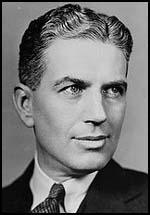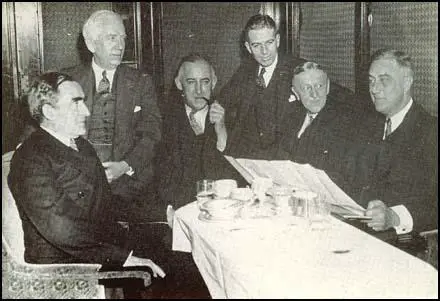Rexford Tugwell

Rexford Guy Tugwell was born in Sinclairsville, Chautauqua County, on 10th July, 1891. His parents, who owned a cannery, were both strong supporters of the progressive politician, William Jennings Bryan, who as the Democratic candidate, failed on three occasions to become president of the United States (1896, 1900 and 1908).
Tugwell studied at the University of Pennsylvania, in the Wharton School of Finance and Commerce. He later claimed he was greatly influenced by two of his tutors, Scott Nearing, John Dewey and Simon Patten. An impressive student, after he graduated, he was recruited to the teaching staff of the Wharton School.
In 1917 Tugwell moved to the University of Washington. This was followed by periods at the American University in Paris and at Columbia University, where he eventually became professor of economics. He wrote extensively about his belief that government economic planning could reduce the wastefulness of capitalism. John C. Culver described him as "handsome and urbane... he was a curly-headed Columbia University economics professor with a passion for national planning."
Tugwell was a member of the Democratic Party and a close friend of Franklin D. Roosevelt, the Governor of New York. In 1932 he joined a team that included Henry A. Wallace, Henry Morgenthau, George N. Peek and Hugh S. Johnson, to advise Roosevelt on agricultural policy during the presidential election. Wallace and Tugwell were both impressed with a plan put foward by M. L. Wilson, a professor of agricultural economics at Montana State Agricultural College. Wilson's idea was called the domestic allotment plan. Farmers who agreed to limit production would be rewarded with "allotment payments" which would supplement the income they received for crops on the open market. Its main purpose was not to subsidize farmers but to control production.
Tugwell was one of Roosevelt's most important advisors during the 1932 Presidential Election. Tugwell joined what James Kieran of New York Times called the Brains Trust. Other members included by Raymond Moley, Adolf Berle, Basil O'Connor, Bernard Baruch , Ernest Cuneo, Hugh Johnson, Frances Perkins , Harry Hopkins , Harold Ickes , Louis Brandeis , Cordell Hull, Henry Morgenthau, Thomas Corcoran, Robert Wagner and Felix Frankfurter . It has been argued by Patrick Renshaw: "Politically, Tugwell was on the left with Berle on the right. Moley chaired regular meetings of the brains trust, which Samuel Rosenman and Basil O'Connor also attended. FDR was not an intellectual, but enjoyed their company and was in his element at the free-wheeling discussions which hammered out the New Deal."
It has been argued by William E. Leuchtenburg, the author of Franklin D. Roosevelt and the New Deal (1963): "They argued economic doctrine through long spring evenings at the Governor's fireside in Albany, held audiences for economists in a hotel suite in New York City, and wrangled over drafts of campaign speeches... After the election... Moley continued to serve as minister without portfolio in the months before the inauguration; he interviewed experts, assigned men to draft bills, and hammered out the legislation of the Hundred Days."
The group disagreed about many issues. Raymond Moley argued that the government should work very closely with businessmen whereas Tugwell distrusted business and placed his confidence in government planners who would administer the economy. Adolf Berle wanted the government to "evangelize the businessman rather than resort to the naked power of the state". Tugwell and Berle were also influenced by the economic ideas of J.A. Hobson and John Maynard Keynes but Moley held serious doubts about rapidly increasing government spending.

Davies, Raymond Moley, Rexford Tugwell and William Woodin in 1932.
Although Franklin D. Roosevelt was vague about what he would do about the economic depression, he easily beat his unpopular Republican rival. William E. Leuchtenburg has argued: "Franklin Roosevelt swept to victory with 22,800,000 votes to Hoover's 15,750,000. With a 472-59 margin in the Electoral College, he captured every state south and west of Pennsylvania. Roosevelt carried more counties than a presidential candidate had ever won before, including 282 that had never gone Democratic. Of the forty states in Hoover's victory coalition four years before, the President held but six."
Roosevelt asked Tugwell what post he would like. He replied that he would like to appointed assistant secretary of agriculture under Henry A. Wallace. The authors of American Dreamer: A Life of Henry A. Wallace (2001) has commented: "They presented a rather odd picture together - the dapper Columbia University professor and the tousled Iowa editor - but they made a good team. They were men of ideas and shared a vision of government that was activist and progressive. Wallace knew the practical aspects of American farming in the way a sailor knew the stars. And Tugwell knew Franklin Roosevelt."
On 8th March 1933, Wallace and Tugwell met with Roosevelt and asked him to expand the scope of the special congressional session to include the agricultural crisis as well as the banking emergency. Roosevelt agreed to this suggestion and it was agreed to summon the nation's farm leaders to an "emergency conference" to be held in Washington. Wallace went on national radio and told the country: "Today, in this country, men are fighting to save their homes. That is not just a figure of speech. That is a brutal fact, a bitter commentary on agriculture's twelve years' struggle.... Emergency action is imperative."
After being elected, Roosevelt appointed Tugwell as an assistant secretary to the Agriculture Department. In 1934 he was promoted to under under secretary where he worked closely with Henry Wallace. Roosevelt consulted Tugwell about many aspects of the New Deal and helped to plan the Agricultural Adjustment Act.
According to William E. Leuchtenburg, Tugwell had been greatly influenced by progressives like Robert LaFollette Jr., and headed the faction that advocated extensive government planning, heavy spending for relief and public works, and curbs on profiteers." During the banking crisis he urged Roosevelt to set up a national bank and take over "large blocks of paralyzed industries". Tugwell defended his liberal views by arguing: "Liberals would like to rebuild the station while the trains are running; radicals prefer to blow up the station and forgo service until the new structure is built."
Tugwell's main opponent in the cabinet was Budget Director Lewis Williams Douglas. Leuchtenburg argued that "Douglas opposed government spending, abhorred currency tinkering, and believed that prosperity would come by balancing the budget and leaving capital investment to private industry". Douglas told Roosevelt that Tugwell's ideas might create the "establishment of a communistic or fascistic order of society". He also suggested that these measures would destroy the "middle-class by paper inflation or unbearable taxation". Douglas also supported regressive tax policies. His views were also shared by Raymond Moley.
On 30th August, 1934, deeply troubled by Roosevelt's fiscal policies, Douglas resigned. Some weeks later he wrote to President Franklin D. Roosevelt: "I hope, and hope most fervently, that you will evidence a real determination to bring the budget into actual balance, for upon this, I think, hangs not only your place in history but conceivably the immediate fate of western civilization." He was replaced by Henry Morgenthau, whose views were more like those of Tugwell than Douglas.
Although a strong supporter of economic planning, Tugwell was more conservative in his views about federal relief programs. Eventually he became convinced that the country needed a balanced budget, Tugwell opposed the idea of an extensive welfare system. In 1937 Tugwell resigned from the Roosevelt administration and became vice president of the American Molasses Company. However, the following year he returned to public service when he was appointed as chairman of the New York Planning Commission.
Tugwell became governor of Puerto Rico in 1942. This was a popular appointment and during the next four years improved the civil service, established auditing procedures and helped to diversify Puerto Rican agriculture and to reduce its dependence on sugar production.
In 1946 Tugwell returned to teaching and worked at the University of Chicago (1946-57) and the Center for the Study of Democratic Institutions at Santa Barbara (1957-1964). Along with his friend, Henry A. Wallace, he formed the Progressive Citizens of America (PCA). Members included Paul Robeson, W.E.B. Du Bois, Arthur Miller, Dashiell Hammett, Hellen Keller, Thomas Mann, Aaron Copland, Claude Pepper, Eugene O'Neill, Glen H. Taylor, John Abt, Edna Ferber, Thornton Wilder, Carl Van Doren, Fredric March and Gene Kelly. A group of conservatives, including Henry Luce, Clare Booth Luce, Adolf Berle, Lawrence Spivak and Hans von Kaltenborn, sent a cable to Ernest Bevin, the British foreign secretary, that the PCA were only "a small minority of Communists, fellow-travelers and what we call here totalitarian liberals." Winston Churchill agreed and described Tugwell and his followers as "crypto-Communists".
During his lifetime, Tugwell had twenty books published including The Stricken Land (1946), The Democratic Roosevelt (1957), The Light of Other Days (1962) and The Brains Trust (1968).
Rexford Guy Tugwell died in Santa Barbara, California, on 21st July, 1979.
Primary Sources
(1) Rexford Tugwell was an assistant secretary in the Agricultural Department in 1933. He wrote about his experiences in The Democratic Roosevelt (1957)
During the late spring the Civilian Conservation Corps got underway with some awkwardness. What had begun as a simple notion that the experienced foresters would take under their care and direction a certain number of idle young men turned out in practice to be not so simple. There were problems of recruiting; who was to be chosen? There were problems of housing; who was to build the camps? It was finally decided that all those sent to camps should come from families on relief. It was also decided, when pacifying the unions had become something of an issue, that the boys would not build their own camps but that union labour would do it.
(2) Rexford Tugwell, The Democratic Roosevelt (1957)
Franklin had long known about the European experience with insurance against the hazards of industrial life, even with that against unemployment, although this was the most doubtful of the insurances he had in mind. Actuarial figures about old age, accidents, illnesses, and the like, were dependable. He had determined on a contributory scheme. Deductions from pay envelopes and enforced contributions from employers would carry all these costs. Unemployment was the real social risk because it was unpredictable.
(3) Rexford Tugwell, The Democratic Roosevelt (1957)
Senator Wagner had been chairman of the National Labor Board during the first half of NRA. During that service he had seen how little could be accomplished without powers to enforce the principles that were supposed to be those of all New Dealers. Such intractable employer corporations as Weirton Steel, Budd Manufacturing, and Ford Motor were either refusing compliance or were making use of company unions to evade collective bargaining.
In February 1934, Senator Wagner induced Franklin to issue two executive orders authorizing the Board to hold elections for determining bargaining agents and to prevent violations to the Department of Justice for prosecution. But Wagner was convinced that more was necessary and on 1st March he introduced a Labor Disputes Bill.
Senator Wagner's bill enumerated several "unfair practices" to be prohibited, such as the sponsoring by employers of company unions, interfering with employees' choice of bargaining representatives, and refusal to bargain with elected agents. Under the bill a new labor board would be set up, fully equipped with staff to investigate and powers to enforce the provisions of the act.
